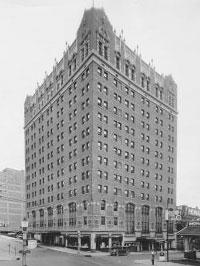On February 2, 1940, Senator Harry S. Truman decided to run for reelection despite the possibility that his political career was nearing its end. He faced a tough primary against Lloyd C. Stark, the governor of Missouri who had just led a successful campaign to topple the Kansas City political machine that had supported Truman’s career.
In 1936, the machine, led by Tom Pendergast, stuffed so many ballot boxes for Democratic candidates that more votes were tallied than the entire registered population of Kansas City. Cheating at the polls, appointing allies to city jobs, and using city resources for illegal income was nothing short of routine for political bosses of the era, but Pendergast had so far evaded detection by anyone in a position to stop him. Governor Stark assisted the state election board in its investigation of the 1936 voter fraud. Stark then facilitated a federal investigation into Pendergast’s income tax records in 1938. In 1939, Pendergast was indicted for income tax evasion and went to prison for 15 months.
Truman’s longstanding connections to Pendergast immediately became a liability. In 1922 Pendergast helped Truman start his political career by supporting his candidacy for the Jackson County judgeship. In Jackson County, the county judges were responsible for management issues as much as for courtrooms. Truman accordingly managed county road development and the construction of a new county courthouse. He gained respect among Jackson County residents, but he had not seriously contemplated running for the Senate until asked to by Pendergast in 1934. With machine support in Kansas City and a carefully crafted campaign through the rest of Missouri, Truman won the 1934 election.
To virtually any political analyst, the fall of Pendergast meant the fall of Truman. Truman, a candidate long associated with Pendergast, would have to run against the man who exposed the machine’s corruption in the first place. Nonetheless, at the Hotel President in Kansas City, Truman stubbornly announced to several colleagues that he would run for reelection to the U.S. Senate. He toured the state and gave dozens of speeches explaining his background as a World War I veteran and a true representative of the people. In the end, voters decided that Truman had avoided involvement in the seedy elements of machine politics, and he won the improbable reelection in the fall.
Truman’s victory paved the way for President Franklin Roosevelt to name him the Democratic vice-presidential running mate in 1944. Accordingly, when Roosevelt died in 1945, Truman became president of the United States and oversaw the end of World War II, including his decision to use the atomic bomb against Japan. With a flagging economy and a resurgent Republican Party, though, Truman was again the underdog when running against Thomas Dewey for president in 1948. In an electoral comeback reminiscent of the 1940 Senate campaign, Truman won the 1948 election to serve a full term as president. Ironically, just eight years before that Truman sat in Kansas City contemplating the probable end of his political career.
Read biographical sketches of persons and places related to Harry Truman’s career, prepared by the Missouri Valley Special Collections, The Kansas City Public Library:
- Biography of Harry S. Truman (1884-1972), President of the United States (1945-1953), by Susan Jezak Ford
- Biography of Thomas Pendergast (1873-1945), Business Owner and "Political Boss", by Susan Jezak Ford
- Biography of Henry Francis McElroy (1865-1939), City Manager; associated with Tom Pendergast and Harry S. Truman, by Nancy J. Hulston
- Jackson County Courthouse Profile
View images of Harry Truman that are a part of the Missouri Valley Special Collections:
- Harry Truman at University of Kansas City Law School, 1945
- Harry Truman at Tom Pendergast's Funeral, 1945
- Harry S. Truman Statue
- Truman Presidential Library
- Harry and Bess Truman, 1953
- Harry S. Truman Residence
Check out the following books about Harry Truman’s early career and Tom Pendergast:
- Truman and Pendergast, by Robert H. Ferrell; examines Pendergast’s role in Truman’s political career.
- Truman: The Rise to Power, by Richard Lawrence Miller.
- “The Election of Harry S Truman to the United States Senate,” by Philip A. Grant, Jr., in the Missouri Historical Society Bulletin, volume 36, January 1980, pp. 103-109.
- “Kansas City Blacks, Harry Truman and the Pendergast Machine,” by Larry Grothaus, in the Missouri Historical Review, volume 69, October 1974, pp. 65-82.
- The Bosses, by Alfred Steinberg; includes a chapter on Tom Pendergast, among other bosses.
Visit the following museums with exhibits about Harry S. Truman:
- Harry S. Truman Library and Museum, 500 W. US Hwy. 24, Independence, MO 64050, (800) 833-1225
- Harry S. Truman Historic District, 223 N. Main St., Independence, MO 64050, (816) 254-9929
- Harry S. Truman Farm Home, 12301 Blue Ridge Blvd., Grandview, MO 64030
- The Harry S. Truman Courtroom and Office, Jackson County Courthouse, (816) 252-7454
- Harry S. Truman Little White House; where President Truman wintered, 111 Front St., Key West, FL, (305) 294-9911
Continue researching Harry Truman and Tom Pendergast using archival material:
- Vertical File: Truman, Harry S., the Missouri Valley Special Collections
- Vertical File: Truman, Harry S.—Death of, and funeral, the Missouri Valley Special Collections
- Vertical File: Residences--Truman, Harry S., the Missouri Valley Special Collections
- Vertical File: Historic District--Truman, the Missouri Valley Special Collections
- Manuscript: Judge Truman Runs For the Senate, by John W. Keiter, the Missouri Valley Special Collections
- Vertical File: Stark, Lloyd C., the Missouri Valley Special Collections
- Truman Papers, Personal Papers, or Federal Records at the Harry S. Truman Library
- Biographical Directory of the United States Congress; offers a more complete listing of archival resources
References:
Robert H. Ferrell, Truman and Pendergast (Columbia, MO: University of Missouri Press, 1999), 45-61, 80-105.
Susan Jezak Ford, Biography of Harry S. Truman (1884-1972), President of the United States (1945-1953), Missouri Valley Special Collections.



